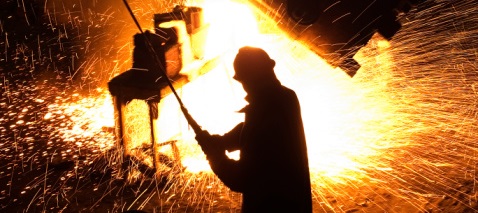‘Remarkable’ transformation
On its first anniversary British Steel, which took over Tata’s Scunthorpe steelworks last year, has given workers a 5 percent stake in the business after returning a profit of £47m.
Unite welcomed the news but warned that pressures on the UK steel industry remain and blasted the lack of government support for the crucial sector as “reprehensible”.
British Steel’s Scunthorpe site is one of only two blast furnaces in the UK. The other, in Port Talbot, is owned by Tata Steel.
British Steel was reformed last June after Tata’s long products business was bought out by the Greybull investment firm for £1.
The name was previously dropped after the original British Steel merged with Corus in 1999.
During the year to March 31, British Steel made a profit of £47m – a complete turnaround from the £79m loss the year before when Tata Steel owned the operation.
As well as receiving a 5 percent stake in the business, Greybull employees have also had a 3 percent pay cut, which was imposed as part of the takeover from Tata, reversed.
Greybull executive chairman, Roland Junck, said, “The transformation in this business is remarkable and that is down to our remarkable people who have embraced, engineered and led change.
“They are the reason we can today reveal the best financial performance in the long products business since 2007 and they are the reason I have great optimism for the future of British Steel.
“In 12 months we have started transforming from an inward-looking production hub into a profitable, more agile business by controlling costs, improving our product range and quality, and through strategic investments.”
Unite national officer for steel, Harish Patel, welcomed the positive results and said that Greybull members are “feeling much more secure today than they did a year ago.”
Patel was clear, however, that the steel industry still faced “serious challenges” and needs government assistance.
He said, “The problem of China dumping cheap steel into the European market is a key issue. The failure of the European Union to take action to tackle this problem is very worrying. 

“On a local and national level the government’s failure to support the steel industry and its lack of an effective industrial strategy is absolutely reprehensible.
“The government should be investing in British Steel’s future by providing relief on business rates, while also providing financial incentives to encourage research and development.”
 Like
Like Follow
Follow


